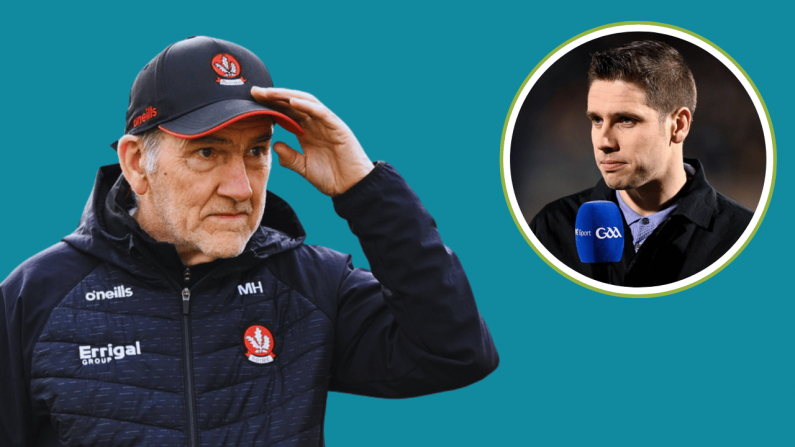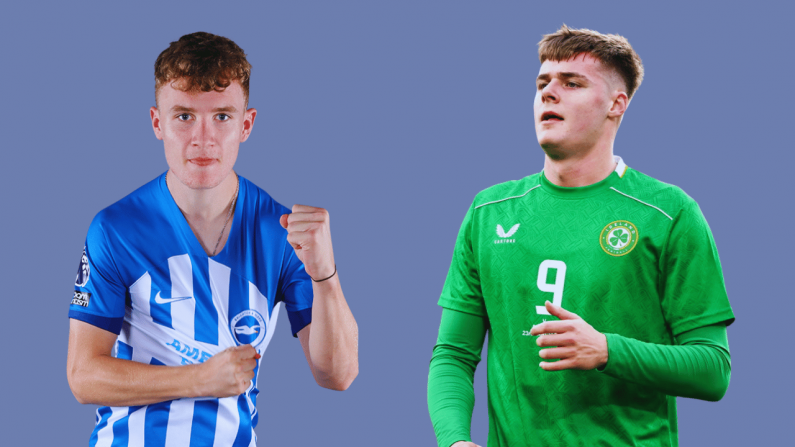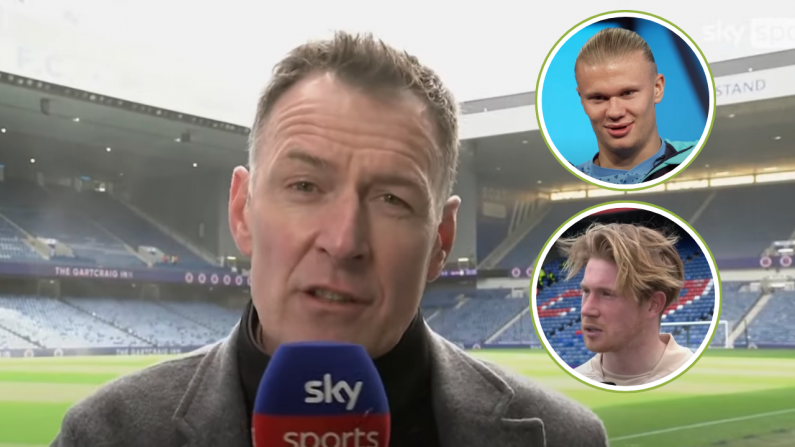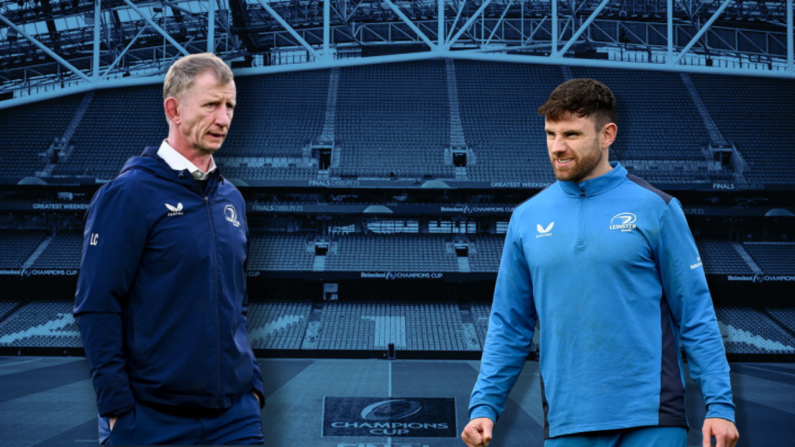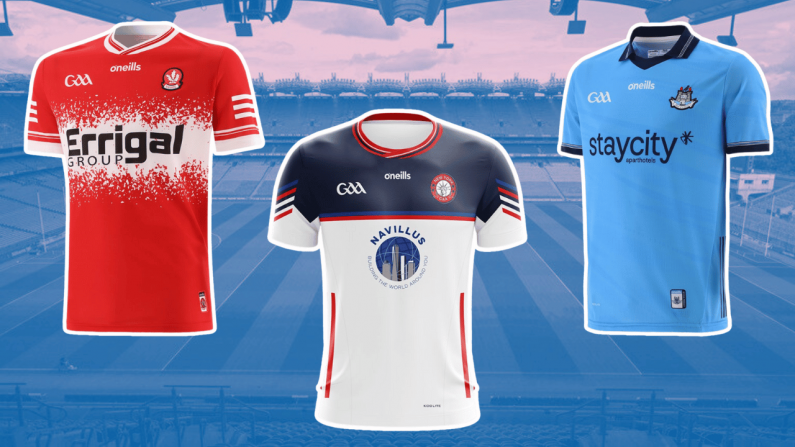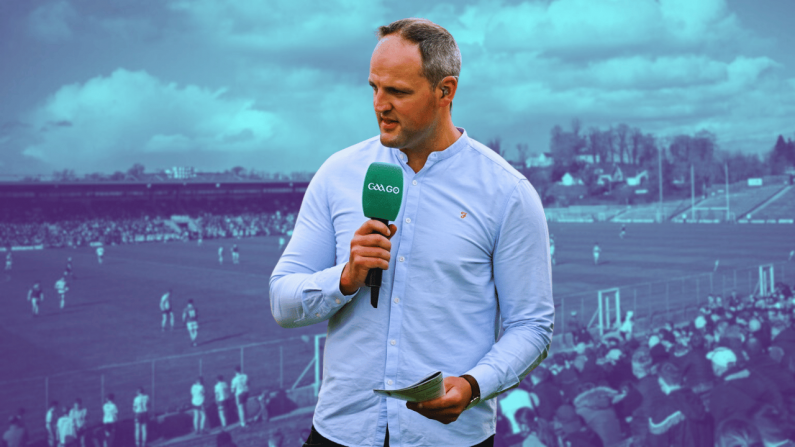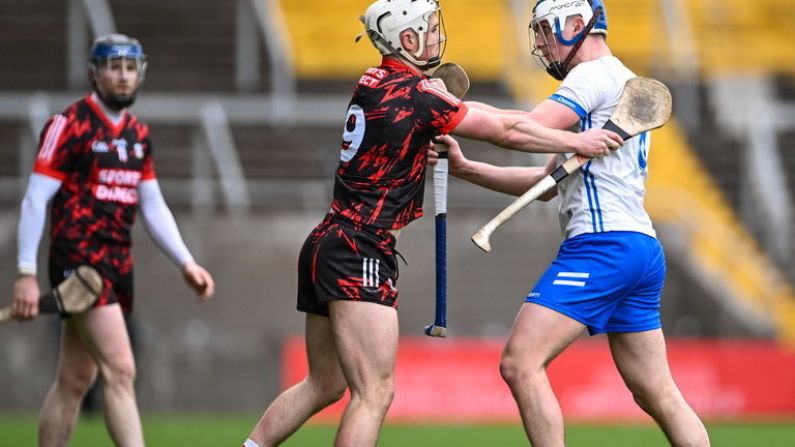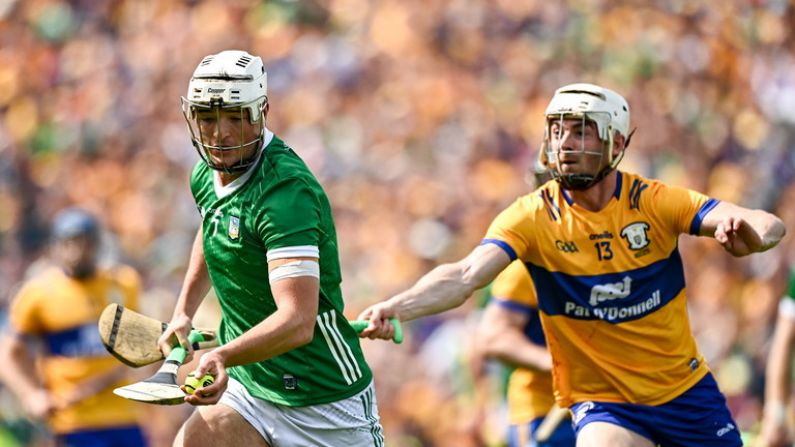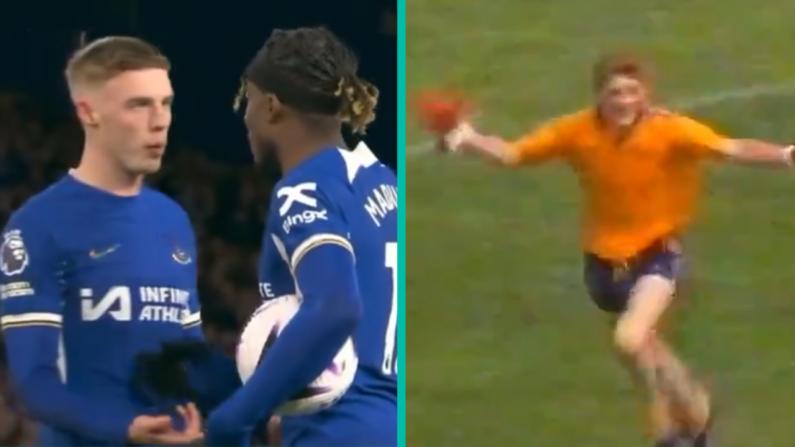Ahead of next weekend's All-Ireland senior football semifinal, which sees the Kerry and Tyrone rivalry reignited, we've taken a look at one of the most fascinating rivalries in the history of gaelic football.
'The most significant win in Tyrone’s history'
Mícheál Ó Muircheartaigh recalls people leaving the ground that day in September 1997 not talking about the individual performances, like Mark Harte scoring 12 points, but about 'the match'. For the legendary commentator, that was the mark of a great game.
It is one still spoken about in Tyrone. "I think we changed as a county and as a team that day," said Mark Harte in the documentary, 'Tír Eoghain: The Unbreakable Bond'.
Tyrone had just beaten Kerry 0-23 to 0-21 in an epic extra-time encounter to reach the county's first All-Ireland minor final in 22 years.
A fortnight earlier, in front of 65,000 at Croke Park, the Kerry and Tyrone minor sides had played out a draw. Tyrone had been three points down in injury time, but somehow found a way back. A point from Mark Harte - son of then Tyrone minor manager Mickey Harte - set up a replay at Parnell Park.
That summer was one of triumph and tragedy for the Tyrone minors. As he scored a goal during an Ulster Championship game against Armagh, Paul McGirr was involved in a collision, and would later die in hospital.
"That was just maybe the saddest of our lives at that stage for sure," Mickey Harte said in his Laochra Gael episode.
Tyrone won that game by the four points which McGirr had scored. For the remainder of their journey that summer, the team left McGirr's number 12 jersey vacant.
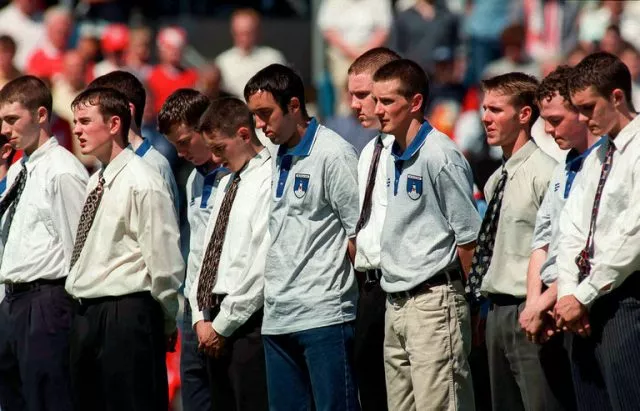
29 June 1997; Players from the Tyrone and Monaghan minor teams stand for a minutes silence for the late Paul McGirr prior to the Ulster SFC semi-final match between Tyrone and Derry at St. Tiernach's Park in Clones, Monaghan. Photo by David Maher/Sportsfile
Between the draw with Kerry and the replay, there was another tragedy when Kevin Hughes's older brother Paul died in a car accident. Despite unimaginable pain, the hugely influential Hughes lined out in midfield for the replay.
"The night of the drawn Kerry game, when I got off the bus, my brother was there waiting for me," he said in 'Tír Eoghain: The Unbreakable Bond'.
"He gave me a big hug, and says, 'I'm so proud of you, our boy'. That really comforted me at the time. It surprised me at the time, because it was the first time he had ever said anything like that to me.
"For him to say that he was proud of me, and that was the last time he ever saw me play football, it made it an easy decision to go out and make him even prouder."
Following the drawn game, Kerry manager Charlie Nelligan - the seven-time All-Ireland winning goalkeeper - had accused his players of 'lacking heart'. "They seemed to be waiting for it to happen rather than going out and making it happen," Nelligan told The Kerryman. That was a charge he could not level at them in the replay.
Kerry led by a point at the break, but would require an equalising score from Ballyduff man Liam Boyle to take the game to extra-time. In all, the two sides were level on 11 occasions.
"Kerry's travelling band of supporters were treated to a rip-roaring game in which the lead was exchanged more often than phone numbers on a singles night," Brian Carroll wrote in the Kerryman.
In the second period of extra-time, Tyrone raced into a three-point lead and would not be caught. Mark Harte's 12 points that day- 11 of them from frees - caught the eye, but so did the tireless play of Brian McGuigan and Hughes.
"Kevin's brother was killed in a car crash while he was at training last weekend and yet he came out here and played today." Mickey Harte said after the game.
"We never mentioned this or the tragic death of Paul McGirr earlier in the year in the pre-match talks. We don't use them to motivate the players, but we all know in our hearts that there is something special to play for.
"At times when it really mattered to win a ball, our boys could do it. They won 40/60 ball at times today. We have a very high motivating influence this year, and it's something that is inside the players driving them on."
Many of Tyrone's players had grown up watching 'Kerry: The Golden Years' on repeat. The Kingdom were football nobility, but that day taught Tyrone a valuable lesson: The aristocracy could be toppled.
"This was a rare moment," Mickey Harte said in his autobiography.
"Tyrone people in the stand cried that day. Beyond being a stirring win for these boys, this was a landmark for Tyrone football.
"To this day, many Tyrone people would say that victory was the most significant win in Tyrone’s history. It was a statement of what was possible for us in championship football. That sentiment was beyond anything Tyrone people had ever imagined.
"It almost broke the impenetrable myth around Kerry that had been built by Tyrone people for decades and decades. At worst, it left a deep crack that Kerry couldn’t repair."
Three days
In the fourth round of the 2002 qualifiers, Tyrone got a wake-up call when they were beaten by in a replay by Sligo. For many, the defeat was a defining point in their careers. It hit them that they weren't doing enough. When Mickey Harte replaced joint managers Art McRory and Eugene McKenna, it was made clear that just doing enough would not suffice.
This was a group of Tyrone players which had the potential to compete with the best. Under Harte, the county had won an All-Ireland minor title in 1998, and U21 titles in 2000 and 2001.
In Harte's first year as senior manager, they won the Ulster title, and then beat Fermanagh in the All-Ireland quarter-final to set up a last-four game with Kerry. In the build-up, Harte spotted a piece of trivia in the Irish News: Tyrone had never beaten a Leinster or Munster team in an All-Ireland semi-final. The game would be a chance for his side to make history.
Aided by the video analysis of Peter Quinlivan, Harte realised that the scores of key Kerry forwards Colm Cooper and Mike Frank Russell mostly came from the central areas in front of goal. His plan was to clog that part of the pitch. It worked perfectly.
Cooper had won All-Star in 2002 running onto to diagonal balls, turning and kicking points. When he faced Tyrone that day, he was able to do the first two parts of his trademark move, but the third was severely impeded.
"It shocked me," he said in his autobiography.
"And on some level it fed a certain resentment. An almost arrogant, this-isn’t-fucking-football kind of rage."
The first half of the game produced one of the famous segments of play in Gaelic football history when Tyrone swarmed Kerry players as they attempted to bring the ball past their own 45m line. Dara Ó Cinnéide and Eoin Brosnan were bumped and harried until they coughed it up.
"It was like Times Square out there. I don’t know, is that football now?" said Seamus Moynihan after the game, sitting in a Kerry dressing room suffering from PTSD (Post Tyrone Swarm Disorder).
"To catch Kerry, we needed to hit them with sheer pressure," Harte said in his autobiography.
"Blast them with heat. Work rate. We knew deep inside that if we worked as hard as we could, Kerry wouldn’t be ready for that. If we hit that mark, Kerry might be taken by surprise for long enough that we could escape into a lead. By the time they knew what was happening, it might even be too late. It was high-stakes stuff, but I reckoned it was worth the gamble."
Escape into a lead is exactly what Tyrone did, holding a 0-6 to no score advantage at one stage. There were 25 minutes on the clock before Kerry registered a score through Cooper. Tyrone led by seven at the break, and it was the same margin when the final whistle blew.
"We played into their barrow and tried to bulldoze through them, tried to carry ball, tried to think we would win, because we were Kerry, and Tyrone should certainly not be stopping us," said Tomás Ó Sé in his book, 'The White Heat'.
"The reality is that we should have been moving that ball on as quick as we got it, playing with the hunger and fervour they did. It was a new beginning, another step in the development of football.
"Afterwards there was a sense of shock in the dressing-room. Total shock. A sense of ‘This shouldn’t be happening to Kerry,’ which was probably part of the problem: a touch of arrogance. Mentally we weren’t ready for a battle, and maybe the green-and-gold jersey drove them on even further."
Later that evening, Kerry legend Pat Spillane added to the notoriety of Tyrone's style when he called it "puke football". One of GAA's most famous scenes had spawned one of its most infamous punditry moments.
Tyrone went on to win the county's first senior All-Ireland a month later with a three-point win over Armagh. It was the first final contested between sides from the same province.
In the week after the semi-final defeat, Kerry manager Páidí Ó Sé was swiftly ushered to the exit door and Jack O'Connor was later appointed as his successor.
Just over five months after Tyrone's All-Ireland victory, there was another tragedy when, aged just 24, 2003 All-Star Cormac McAnallen - one of Mickey Harte's most trusted players - died in his bedroom. Sudden adult death syndrome, a heart condition, was the cause. The rivalry on the pitch did not stop Kerry players, like Darragh and Tomás Ó Sé, paying their respects.

28 September 2003; Tyrone's Enda McGinley, left, Declan McCrossan, centre, and Cormac McAnallen, right, celebrate after victory over Armagh in the All-Ireland Senior Football Championship final at Croke Park, Dublin. Picture credit; Brendan Moran / SPORTSFILE
"Cormac had died in the middle of the night and the Kerry boys must have started out as soon as the news broke, because it would have taken seven hours of travelling from West Kerry to Eglish," Seán Cavanagh recalled in his autobiography, 'The Obsession'.
"I looked at them and one thought struck me. These were the guys on whom we had inflicted ‘puke football’ a few months earlier. Fellas we were supposed to ‘hate’, who were destined to hate us in return.
"And yet here they were in Cormac’s house, having driven the length of the land at no notice, their only thought to support the family and in turn to support us."
'One Is Not Enough'
At the 2004 Kerry GAA convention, there was a giddiness to county board chairman Sean Walsh's address. Kerry were All-Ireland champions again, back on top after an eight-point win over Mayo.
Though, it was one of those All-Ireland victories for which Kerry receive little credit, both inside and outside the county. 'The bad All-Ireland', more benevolently called 'the handy All-Ireland', is a concept alien to those not raised in Kerry. Still, that didn't stop Walsh making a declaration which undoubtedly rankled in Tyrone and Armagh.
"12 months ago pundits were proclaiming the death of football as we knew it," said Walsh.
"We are delighted that it took a Kerry team to restore the pride in Gaelic football. The return to a free flowing game from the packed defence type game is welcomed by the thousands of supporters that travel to our games."
Tyrone were beaten by Armagh in the 2005 Ulster final, but gained revenge six weeks later in the All-Ireland semi-final to set up the decider against Kerry. It was a different Tyrone team at this stage. Their squad was deeper, and they no longer wore that underdog status.
The mission was different to 2003. Other Ulster teams in the previous 15 years, apart from Down, had won single All-Irelands and then slipped away.
"We had to show that 2003 wasn’t a freak accident," said Harte in his book.
"Staging an ambush to catch Kerry might have been part of the process, but we didn’t see ourselves as an ambush team. We were a team of quality. We had to convince the wider world of that."
Tyrone wanted more, and they got it after victory in a classic final.
A goal from Dara Ó Cinnéide gave Kerry an early advantage but Tyrone hit back just before half-time with a famous goal from Peter Canavan.
Phillip Jordan's long ball to the edge of the square was caught by Owen Mulligan. Canavan, like a chess player thinking several moves ahead, already knew how it was going to play out. He arced his run around Mulligan as he demanded the ball, and side-footed it past the giant Diarmuid Murphy. It was a dagger to Kerry's chances, and also one of the final acts in the career of Canavan, one of the game's greatest players.
A goal from Tomás Ó Sé drew Kerry close in the second half but they could not reel in Tyrone as they won, 1-16 to 2-10.
"Winning that All-Ireland title also brought a sense of closure," said Harte.
"If we hadn’t won that All-Ireland title, Cormac’s statement could have turned from a mantra into a millstone. One Is Not Enough. If the years had gone on without delivering the second All-Ireland, we would have started to wonder about ourselves. Now we were released. We had kept our side of the bargain to him."
'We Blew It'
Kerry won consecutive All-Irelands in 2006 and 2007, the first time the feat had been completed since Cork did it 17 years earlier. Jack O'Connor was in charge for the first win, and Pat O'Shea for the second.
On the same August day in Croke Park, in an All-Ireland semi-final double-header, Kerry beat Cork in a replay and Tyrone defeated Wexford to set up the trilogy fight.
"I remember reading a few interviews at the time and it seemed they were already christening themselves the 'Team of the Decade'," said Cooper in his book.
"That stuck in the craw. We were now facing into our fifth All-Ireland final in a row. We’d won three to their two.
"They were full of it. We were biting our tongues. No question, we would have considered them the perfect final stepping-stone to a three-in-a-row.
"But we blew it. We let them off the hook. That’s how I look back on the ’08 final. We weren’t good enough to beat them in ’03 or ’05. But ’08 was different."
By the 2008 final, Kerry had built their twin towers attack with Kieran Donaghy and Tommy Walsh in the full forward line.
Harte spent the three weeks between the semi-final and final devising a plan. He would deploy the McMahons, Joe and Justin, in the fullback line to defuse Kerry's weapons. The brothers from Omagh spent the game screaming at the boys from Tralee. It was "as if trying to communicate the impression they were a little deranged", said the Gooch. Walsh and Donaghy scored just a point between them.
Kerry led at the break but Tyrone muscled back into the lead after 22 seconds of the second half when Tommy McGuigan tapped a scrappy goal to the net. Through the Ó Sé's and Cooper, Kerry retook the lead, but Tyrone hit the final five points of the game - three of them from the Cavanaghs - to seal the win.
"People ask me if it bothers me," said Tomás Ó Sé in his book about not beating Tyrone when it mattered in the noughties.
"I’ve seen other Kerry lads say they don’t lose any sleep over it, and neither do I, but it does irk me. It pisses me off, and I regret that we didn’t beat them, because I felt we were as good as them, or better.
"But they’ll always have that over us, that we never beat them. It’s like Raging Bull: Jake LaMotta has the head beaten off him, but he’s taunting the other guy, ‘You never put me down.’ We have all the All-Irelands we have, but we never put them down."
'Maybe Hate Is Too Strong A Word'
Kerry did put Tyrone on the canvas four years later in a round three qualifier in Killarney. Though, Tyrone had lost their punching power at that stage, and lost by 10 points.
Earlier that month, two hotel workers had been acquitted of murdering Mickey Harte's daughter Michaela while she was on honeymoon in Mauritius. In Killarney, Harte found sympathy for his situation.
"The last person I spoke to leaving the field was Mickey Harte," said Paul Galvin in his autobiography, 'In My Own Words'.
"I told him everyone in Kerry was with him and his family."
Harte and the Tyrone team were applauded onto the team bus, and all the way down Lewis Road into the town.
"It felt an important gesture given the tension that had built up between us as football teams," recalled Cooper.
"Again, maybe hate is too strong a word, but there was definite needle. We had little choice but to grow to dislike them. How could it be any other way when they were the reason for us being ridiculed by the media and, in some cases, even our own supporters? But something broke in the rivalry that day in Killarney."
Nine years on, the two sides are set for just their third championship meeting since that July day at Fitzgerald Stadium. The last two games - the All-Ireland semi-finals of 2015 and 2019 - were both won by Kerry.
Kerry will be favourites for the semi-final. But this is a new Tyrone team. Mickey Harte departed last winter after 18 years in charge. Though, there is a link: Brian Dooher, Harte's trusted lieutenant, is joint manager with Feargal Logan. And Dooher, like those players and management who were involved in that 1997 minor win, will know the walls of the Kingdom can be breached.



